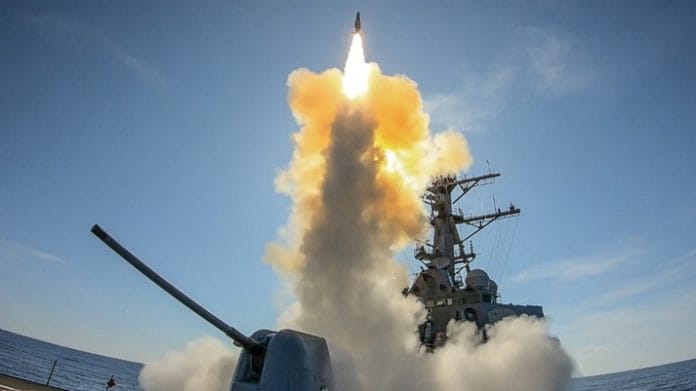By Jamari Mokhtar-The war on the high seas is shaping up to be akin to a naval blockade of Israel. Ships entering the Suez Canal, the Red Sea, the Gulf of Eden and the Bab al-Mundab Strait were given warning shots by the Yemenis Houthis not to proceed with their journey towards Israel. If this is not heeded, they will fire volleys of missiles toward the ships either through their drones or missile launchers.
Yemen, Lebanon, Syria and Iraq form the Axis of Resistance in order to indirectly help Hamas in its fight against the occupation army of Israel. Initially the Resistance’s objective was to confront the build-up of the huge armada in the Mediterranean and Red Seas sent by the US on Oct 8 to defend Israel.
The Houthis’ attack was an attempt to cripple Israel’s economy by destroying its ports, while the Iraqi and Syrian militias kept the Americans busy from intervening directly on the battlefield in attacking Hamas. The US and the Resistance did not want an escalation of the Gaza war to morph into a regional war that could lead to a world war, where millions would be killed. Moreover, the global economy would suffer irreparable damages as the Middle East is a very important node for international trade where oil and gas are found in abundance. Just like the Hezbollah, the Houthis wants a permanent ceasefire in the Gaza war that would stop the genocide of the Palestinian civilians.
When its missile/drone attacks on the southern cities of Israel was rendered “ineffective” due to the presence of US warships which shot down the missiles/drones, it then changed tactics by targeting ships owned, operated by Israeli companies, or carrying the Israeli flag at Bab al- Mandab strait. This has been effective in cutting off the Eilat port by striking at vessels in the Red Sea, and then extending the range of strikes to the eastern Indian Ocean where it meets the Arabian Sea.
Eilat accounts for 45% of car imports to Israel and 5% of all the goods imported to Israel by sea. The Houthi campaign has cut the port revenue by 80% since October 7.
As the US was still busy preparing a naval coalition of the willing to confront the Houthis, it learned that the oil tanker MV Chem Pluto had been hit in the Indian Ocean, 1,600 kilometres east of the Red Sea and Yemen coast on December 23. This has now expanded to all shipping in the Red Sea, Gulf of Aden, and Indian Ocean if their management and ownership are based in the US and the European states allied with Israel in the Gaza war, and also with the US in the war against Russia in Ukraine.
Earlier the US Defence Secretary Llyod Austin visited Israel to discuss setting up Operation Prosperity Guardian, further escalating the situation. He then boasted some 20 countries have agreed to join the coalition and in a sign of US’ international “isolation”, Austin said some countries had requested their participation remained anonymous. The American then instigated Saudi Arabia to join and postpone the signing of its peace agreement with the Houthis, with offers of new military training for the Saudi army and promises to lift an arms embargo on offensive weapons imposed by the White House.
It also failed to anticipate the Russian response to the formation of Op Prosperity Guardian. The Ukraine war has made the Russian very distrustful of any US military build-up. Although Russia has already won the sanctions war, the US and the EU
have not disavowed the sanctions which means they could attack Russian ships carrying sanctioned oil cargoes under Op Prosperity Guardian or through false flagged operations which both the US and Israel are very good at. Instead of sending its navy to protect its crude oil cargo ships, Russia via diplomacy has negotiated with both Iran and Yemen for safe passage of its ships. Concurrently its Brics partners, China and India had also negotiated safe passage for their commercial shipping with Iran and Yemen, and their navies were already in the vicinity of the Red and Arabian Seas. But the tense situation dissipated when the US-sponsored naval coalition collapsed so soon after its formation in a further sign that the US is
internationally isolated.
One by one EU countries like France, Spain, Italy and Greece bowed out from the coalition due to intense bickering among them over the objective of the naval coalition. While the Europeans were more concerned on protecting their commercial
ships and expect assistance from the US if their ships were under attack, they discovered the American was more interested in an escalatory war on the high seas with Yemen and Iran. The Europeans who do not want to see rival economic giant China enjoying an advantage of uninterrupted and peaceful commercial shipping in the high seas then did the “unthinkable”.
They too followed the lead paved by Russia, China and India for safe passage of their commercial shipping through diplomacy with Iran and Yemen. In yet another sign of US’ international isolation, Saudi and US officials told the New York Times Saudi Arabia is “uninterested” in being dragged back into war with Yemen to protect Israeli interests in the Red Sea.
The kingdom “would rather watch these latest developments from the sidelines, with the prospect of peace on its southern border a more appealing goal than joining an effort to stop attacks that [Ansarallah says] are directed at Israel.” This approach “is driven by the reality that after eight years of war, [Sanaa] effectively won”. As for the heightened situation involving Chinese and Indian naval fleet in close proximity in the high seas, they were there precisely to protect the
unescorted Russian oil cargo ships from any potential attack by the naval coalition of the US simply because the crude oil was theirs – imported from Russia.
Now if Israeli-owned and international shipping are blocked from reaching either the Israeli port of Eilat or Haifa and Ashdod from the east through the Red Sea and the Suez Canal, the Gibraltar Strait in the west is the gateway remaining. But according to John Helmer in his blog Dances with Bear, even the Straits of Gibraltar is not off-limit to the Axis of Resistance.
Helmer quoted a report by TradeWinds, an Oslo-based maritime publication, which indicated Iran may expand the war to threaten shipping moving through the Gibraltar Strait towards Ashdod and Haifa.
The western press has reported this with the qualification “Iran has no direct access to the Mediterranean itself and it was not clear how the (Revolutionary) Guards could attempt to close it off”. Furthermore, “the only groups backed by Iran on the Mediterranean are Lebanon’s Hezbollah and allied militia in Syria, at the far end of the sea from Gibraltar.” However, the western news agencies and the Anglo-American maritime media appear not to be aware of the capabilities of Algeria, whose parliament has authorised the government to take unspecified military measures against Israel early on in the Gaza war.
Algeria’s military is also collaborating closely and recently with the Russian Navy.
As it is, the possibility of a drone attack on an Israeli vessel near the Gibraltar Strait has not yet dawned publicly, not at least in the mainstream and maritime industry media. More than 100,000 vessels transit through the Gibraltar Strait each year.
The result of all these developments is that eerily a day will come when Israel will be starved by this “naval blockade”, just like they are starving the Palestinian civilians in Gaza now. The writer is reminded of a verse from the Quran: “They plot and plan, and Allah too plans; and Allah is the best of planners.” [Al-Anfal (The Spoils of War) 8: 30]. Come to think of it, the Houthis operation in the high seas is a tit-for-tat against Israel’s killing of Palestinian civilians, but with a significant difference – not a single civilian was killed so far.
The US and the EU has the bounden duty to stop supplying weapons, ammunitions and fighter jets to Israel which are being used to kill Palestinians. It also has the duty to enforce a ceasefire to prevent the genocide in Gaza from continuing. No amount of announcement of a ceasefire by the UN – watered-down or otherwise – will make the Houthis stop. It is only when the ceasefire is effectively implemented will the Houthis stop.
Jamari Mohtar is the Editor of Let’s Talk!, an e-newsletter on current affair









